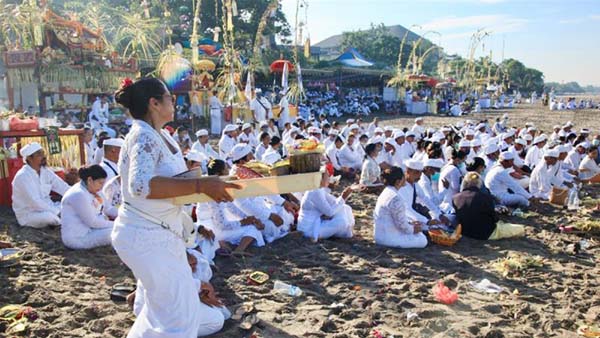
Al Jazeera News :
Denpasar, Indonesia – Authorities in Bali will allow tens of thousands of people to attend Hindu ceremonies for the island’s new year, or Nyepi, celebrations this week in contravention of Indonesian government calls for social distancing, in a move that experts fear will fuel a dangerous increase in cases of COVID-19.
Thousands of foreigners who cannot or do not want to fly home are also having to queue for hours in crowded buildings to renew their visas, creating another potential virus risk on an island that has no testing facilities.
So far, only 71 people on the island of 4 million have been tested by laboratories in Jakarta, which are taking a week or longer to deliver results, and around 40 flights are still scheduled to arrive at the airport each day from the capital despite the declaration of a state of emergency there.
Experts worry that without action, the Indonesia resort island could face a sustained and deadly outbreak.
“If there is not enough testing happening in the early stages, it’s very likely to happen because they won’t know it’s present until people start dying about three weeks later,” said Joel Miller, a mathematical epidemiologist focusing on infectious diseases at Australia’s La Trobe University.
“By that time it will have become a well-established epidemic and the healthcare system of any country will struggle to respond, which is what’s happening in Italy right now.”
More cases reported
Italy, which has now recorded more deaths from COVID-19 than China, has the world’s second-best healthcare by population size, according to Health Care Rankings. Indonesia, which has a population nearly five times the size of Italy’s, is ranked 92nd, just ahead of Iran but far behind Spain and South Korea which are grappling to control outbreaks, even with their more sophisticated health systems.
Craig Cumming, a research associate at the School of Population and Global Health at the University of Western Australia, who has expertise in meta-analysis – statistical procedures for combining data from multiple studies – also said he was concerned.
“The number of people coming together either indoors or outdoors is the one thing that would worry me the most – it definitely puts Bali in the high-risk category,” Cumming said.
“In Australia, we have a developed health care system but Bali is not so well equipped. From a public health perspective, it sounds horrific.”
Over the weekend, Bali’s regional secretary Dewa Made Indra said the island had only three confirmed COVID-19 cases: a 52-year-old British woman who died under isolation at Sanglah Hospital; a 72-year-old Frenchman who collapsed while riding a scooter and who was originally thought to have had a heart attack; and an unidentified resident.
But at the same time, disturbing video footage emerged of a young tourist from Kazakhstan gasping desperately for air after paramedics were called to a guesthouse at Uluwatu, a popular surfing spot on Bali’s Bukit Peninsula. The man and his wife, who also had a high fever, were taken to Sanglah Hospital in the capital Denpasar where a doctor who treated the 52-year-old British victim has also tested positive for COVID-19.
Al Jazeera also spoke to an American woman suffering from coronavirus-like symptoms at the same hospital who claims there are at least 10 other patients in isolation in her ward.
“There are seven locals and three other foreigners just in my hospital’s coronavirus treatment wing,” said Leah Fawn, who is from Washington DC, and has been waiting more than a week for her test results.
“I have no idea where they are from as I can’t see or speak to them. And while I’m being treated very, very well, I’m growing impatient and anxious because I still haven’t received our test results from Jakarta.”
Fawn said she saw many others with suspected COVID-19 cases when she presented herself at the hospital.
“I rode out the symptoms alone as per my doctor’s advice before I went to the hospital. I’m glad I waited because I saw several people turned away at intake who were sick, but didn’t show serious signs of pneumonia. They were told to go because they weren’t sick enough to warrant testing. So sick people in the first stages are going back home to self-isolate but are potentially blending back in with healthy people.”
Fawn is one of tens of thousands of Westerners who stay in Bali on tourist or business visas that require them to leave Indonesia every 60 days.
Over the past week, hundreds of them scrambled aboard flights to Singapore, Kuala Lumpur and other cities in the region to ensure their legal status in the country as borders tightened. But some became infected – or infected others – during their journey.

